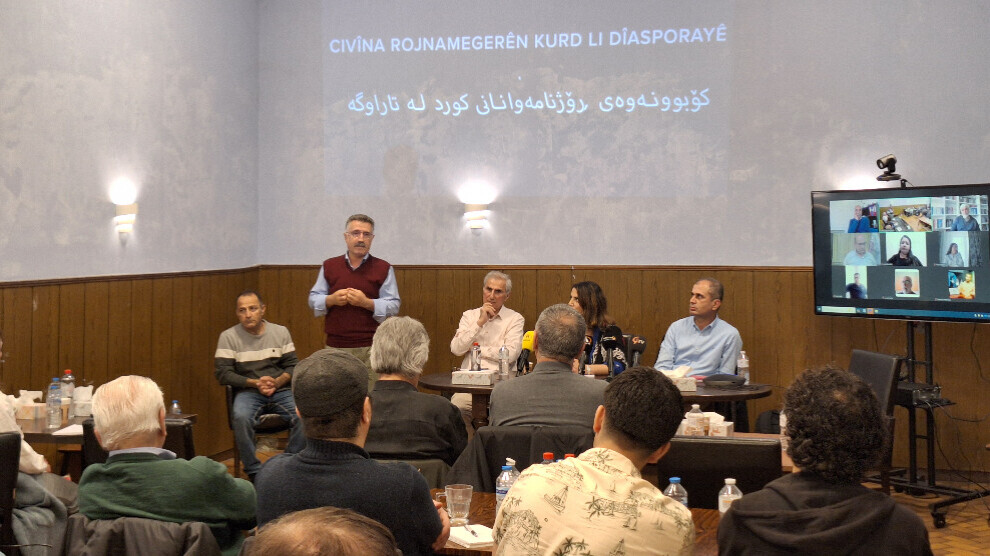Kurdish journalists in Europe seek a new form of organization
Kurdish journalists in Europe met in Aalst to discuss the creation of a new and inclusive organization.
Kurdish journalists in Europe met in Aalst to discuss the creation of a new and inclusive organization.

Kurdish journalists across Europe have gathered in Aalst, Belgium, to discuss both the current state of Kurdish media and to work toward building a new, comprehensive form of organization.
The meeting was attended by journalists from numerous Kurdish media outlets, including Stêrk TV, ANF, Ronahî TV, Channel 8, Çira TV, Medya Haber TV, Jin TV, YRA-Rojava (Free Press Union), NRT, Aryen TV, Metro Center, RONÛS Union, DFG, Ireci-Komele TV, Zom TV, KNN, Dengê Welat Radio, Kurd Archive, CAN TV, Medya News, Deng TV, Malpera Ciwanan, a Kurdish journalist from the French local paper La Marseillaise, and independent journalists.
The gathering was initiated by over 70 journalists. The event, which represents a significant step for the Kurdish media, addressed political developments and their consequences, as well as the role of Kurdish media in these times of change and transformation.
The discussions, conducted entirely in Kurdish, touched upon the current conditions of Kurdish media, the pressures it faces, the state of journalism in exile, and the needs of Kurdish media.
In the opening speech, South Kurdistan journalist Niyaz Abdullah highlighted the suppression of press freedom and pressures on journalists. She focused on the difficulties faced by migrant journalists and the importance of protecting their rights.
Niyaz Abdullah emphasized the importance of defending press freedom everywhere and underlined the need for a Kurdistan journalists’ association or union. She also gave examples of the repression and attacks journalists face in Southern Kurdistan.
Niyaz Abdullah, Amed Dicle, and Dilêr Akreyî were elected to chair the meeting.
Academic and journalist Kamal Chomani pointed out global changes, especially those driven by war. He stated that all four parts of Kurdistan are undergoing transformation, stressing that the most significant hostility toward the Kurds comes from the Turkish state. Chomani noted that Kurdish media must reposition and adapt according to global and regional developments. He criticized the media for still being largely tied to political parties and called for a more critical, democratic, and adaptable press. “We need to be more open to debate and different perspectives,” he said, adding that journalism must move beyond its repetitive and flawed practices.
Journalist Roni Eylem emphasized the importance of discussing how media institutions and journalists should respond to this new phase. He stated that during this period of major change in the Middle East, Kurds have a strategic role to play. He said the Kurdish media should advocate for democracy, human rights, women's liberation, and environmental protection.
Amed Dicle pointed out that issues in Kurdish politics are reflected in the media and emphasized that solving political party issues is necessary.
Selahattin Soro stated that regional and global political developments present both new opportunities and serious dangers for Kurds. “The Kurdish media has a strategic role to play, especially in conveying truths and establishing a common language,” he said.
Hesen Qazi highlighted the history of exiled journalists seeking organization since 1996, criticized past failures, and emphasized the importance of not repeating the same mistakes.
Roza Metina, a representative of the MGK, attended via Zoom and drew attention to the need for broader networks for women journalists and stressed the importance of forming an organization capable of effectively resisting pro-government media manipulation.
Cahit Mervan noted the shift of influence from traditional to digital media and stated that new evaluations must consider the power of digital platforms. He warned that digital media also brings about new monopolies and are used as a tool for disinformation. Mervan pointed to the problems caused by the political affiliation of Kurdish media and said that political parties need to recognize the new reality and the criticisms raised.
YRA Rojava co-chair Dilyar Cizîrî, joining via Zoom, reported that around 100 media outlets are officially registered in Rojava and highlighted the contribution of Rojava’s youth to the global media. “Rojava has created a foundation for all four parts of Kurdistan in terms of media,” he said. He also honored journalists martyred in attacks by the occupying Turkish state, stating that “a foundation for Kurdish media unity has been established here.” Cizîrî added that the Kurdish media has become a source of hope and a model for all media outlets in Syria.
YRA Rojava co-chair Evin Ibrahim spoke about the conditions created for women journalists by the Rojava revolution. She emphasized that “women's resistance and struggle in the field of media continues,” adding that 70% of media workers in Rojava are women. Evin İbrahim stated that more discussions are needed to ensure women in all parts of Kurdistan gain a stronger place in the media and can shape their own agendas.
Journalist and writer Günay Aslan provided evaluations on the role and mission of the media, emphasizing the relationship between media and power.
The meeting is planned to span two days. During this time, the current situation and needs of the Kurdish media will be discussed and assessed. Journalists in Europe hope to develop a model for organization through this gathering, but first, they must reach conclusions through discussion and identify the specific needs in this field.